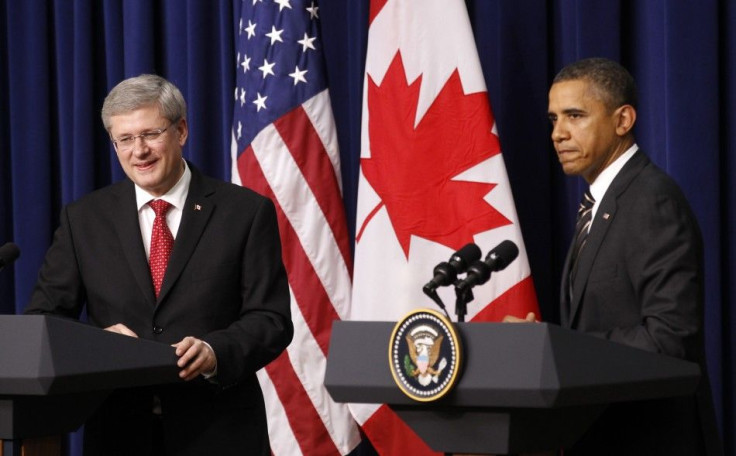Keystone overshadows U.S.-Canada border deal

The United States and Canada have agreed to speed up food and other cargo shipments across their border and to sync some regulations related to drugs and cars, U.S. and Canadian officials said on Wednesday.
Canadian Prime Minister Stephen Harper and U.S. President Barack Obama were set to unveil two action plans, which lay out ways to boost trade, tighten security and reduce regulatory costs, at a joint appearance at the White House on Wednesday afternoon.
An Obama administration official said the initiatives - which will also affect passenger screening - would usher in significant changes to the way Washington and Ottawa work together on economic and security issues.
We see this as a real opportunity both to enhance and expedite the legitimate flow of goods and people across our shared border and at the same time enhancing ... the security of both countries, the U.S. official said.
Harper said the trade and regulatory agreements would help create a new modern border between the countries, which are already linked by a free trade deal that also includes Mexico.
Together, they represent the most significant steps forward in Canada-U.S. cooperation since the North American Free Trade Agreement, he said in remarks prepared for delivery at the White House.
The timeline for the changes was not immediately clear, and many details of the twin agreements on border management and regulations have yet to be worked out. They would also have to be approved by the U.S. Congress and Canadian Parliament.
But Washington and Ottawa have agreed in principle to make it easier for cargo shippers to send goods to both American and Canadian ports through better-aligned regulations on chemicals and auto safety, among other issues, U.S. officials said.
Canada is also set to introduce new screening measures for people traveling to Canada, similar of those in place in the United States, and both countries agreed to upgrade some border infrastructure and tighten cyber security.
The United States and Canada are each other's largest trading partner, and the auto sector in particular often sees cars and car parts shipped back and forth across the border.
But concerns have been rising from Canada in recent years about burdensome security checks by U.S. authorities that have slowed commerce and discouraged some people from traveling.
Canada estimates that inefficiencies at the border impose a direct cost on the Canadian economy of 1 percent of GDP.
Ottawa is also trying to revive a proposed $7 billion pipeline to take Albertan oil to the Gulf of Mexico that Obama put on hold pending further environmental review. The leaders were expected to discuss the TransCanada project as well as other issues including the euro zone crisis in their afternoon meeting at the White House.
© Copyright Thomson Reuters {{Year}}. All rights reserved.





















